
05 May Derald Wing Sue Speaker
Noted Speaker on Microaggressions and DEI – Featued in a new article
Derald Wing Sue speaker— a leading psychologist at Columbia University — and his collaborators give the definition of microaggressions as “the everyday verbal, nonverbal, and environmental slights, snubs, or insults, whether intentional or unintentional, which communicate hostile, derogatory, or negative messages to target persons based solely upon their marginalized group membership.” -Derald Wing Sue Speaker –
The origin of the term “microaggression” dates back to the 1970s, and was coined by African American Harvard University psychiatrist Chester Pierce, specifically in relation to race.
Since then it has expanded to include other marginalized groups including women, LGBTQIA+ people, religious minorities, people with disabilities, and those from low socioeconomic backgrounds.
As conceptualized by Derald Wing Sue Speaker and his colleagues, microaggressions can pertain to three distinct categories:
- microassaults – the most overt form of microaggressions, which come in the form of slights and insults that can be verbal or behavioral
- microinsults — which assert prejudiced stereotypes through insensitive comments that make presumptions about an individual’s intelligence, morality, or belonging to an in-group
- microinvalidations — comments that have the effect of devaluing or denying the lived experience of marginalized people.
Microaggressions may be a result of conscious bias, but they can also reveal unconscious prejudices. Oftentimes a person may deliver a microaggression without consciously admitting that the attitude expressed by their words or actions is discriminatory.
Emerging research suggests that, like more explicit forms of discrimination, this covert type of discrimination has concrete negative impacts on the health of those at the receiving end.
Chronic exposure to microaggressions can have both a direct impact on health, and an indirect impact when it occurs within a system of healthcare. Read the entire Article.

Derald Wing Sue can truly be described as a pioneer in the field of multicultural psychology, multicultural education, multicultural counseling and therapy, and the psychology of racism/antiracism. He has done extensive multicultural research and writing in psychology and education long before the academic community perceived it favorably, and his theories and concepts have paved the way for a generation of younger scholars interested in issues of minority mental health and multicultural psychology. He is author of over 150 publications, 15 books, and numerous media productions. In all of these endeavors, his commitment to multiculturalism has been obvious and his contributions have forced the field to seriously question the monocultural knowledge base of its theories and practices. As evidence of his professional impact, Dr. Sue’s book, COUNSELING THE CULTURALLY DIVERSE: THEORY AND PRACTICE, 2008, 5th Edition (with David Sue – John Wiley & Sons Publishers), has been identified as the most frequently cited publication in the multicultural field; since its first edition, it has been considered a classic and used by nearly 50% of the graduate counseling psychology market.
Because of a personal life-changing experience with racism directed toward his family, Dr. Sue’s research direction has progressively turned to the psychology of racism and antiracism. When he was invited to address President Clinton’s Race Advisory Board on the National Dialogue on Race and to participate in a Congressional Briefing on the “Psychology of Racism and the Myth of the Color-Blind Society”, Dr. Sue realized that the invisibility of “whiteness” and ethnocentric monoculturalism were harmful not only to People of Color, but Whites as well. These experiences and activities have resulted in his critically acclaimed book OVERCOMING OUR RACISM: THE JOURNEY TO LIBERATION, 2003 (Jossey Bass Publishers). Written primarily for the general public, it directly confronted White Americans with their White privilege, inherent biases and their unintentional oppression of Persons of Color. As expected, the book aroused intense feelings and generated difficult dialogues on race.
These reactions led Dr. Sue and his research team at Teachers College to undertake a 10-year study on the causes, manifestations and impact of racial microaggressions. Their groundbreaking work resulted in a taxonomy of racial microaggressions that empowers People of Color by making “the invisible, visible,” by validating their experiential realities, and by providing them with a language to describe their experiences. Dr. Sue is currently broadening research on microaggressions to include religion, gender, disability, sexual orientation and other marginalized groups. Contrary to the belief of most White Americans that microaggressions create minimal harm, his studies suggest that these daily assaults and insults are responsible for creating inequities in education, employment and health care and for producing emotional distress in People of Color. His most recent book, MICROAGGRESSIONS IN EVERYDAY LIFE: RACE, GENDER AND SEXUAL ORIENTATION (John Wiley and Sons Publishers) has already generated much excitement and research. It was awarded the 2010 National Diversity and Global Inclusion Book Prize Award by UnityFirst.Com. His forthcoming book MICROAGGRESSIONS AND MARGINALITY (John Wiley & Sons) extends the concept of microaggressions to many socially devalued groups in our society (race, gender, sexual orientation, class, disability, religion, etc.).


